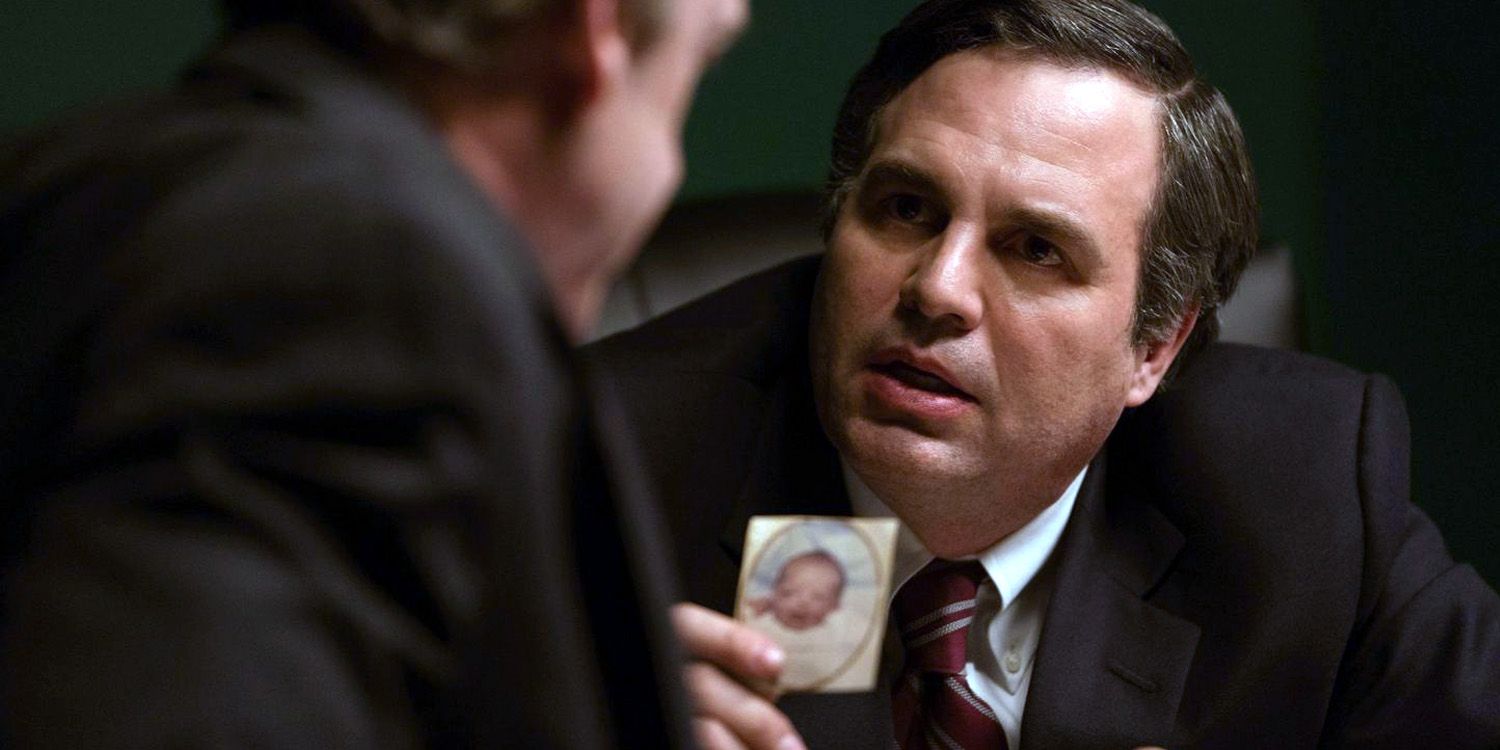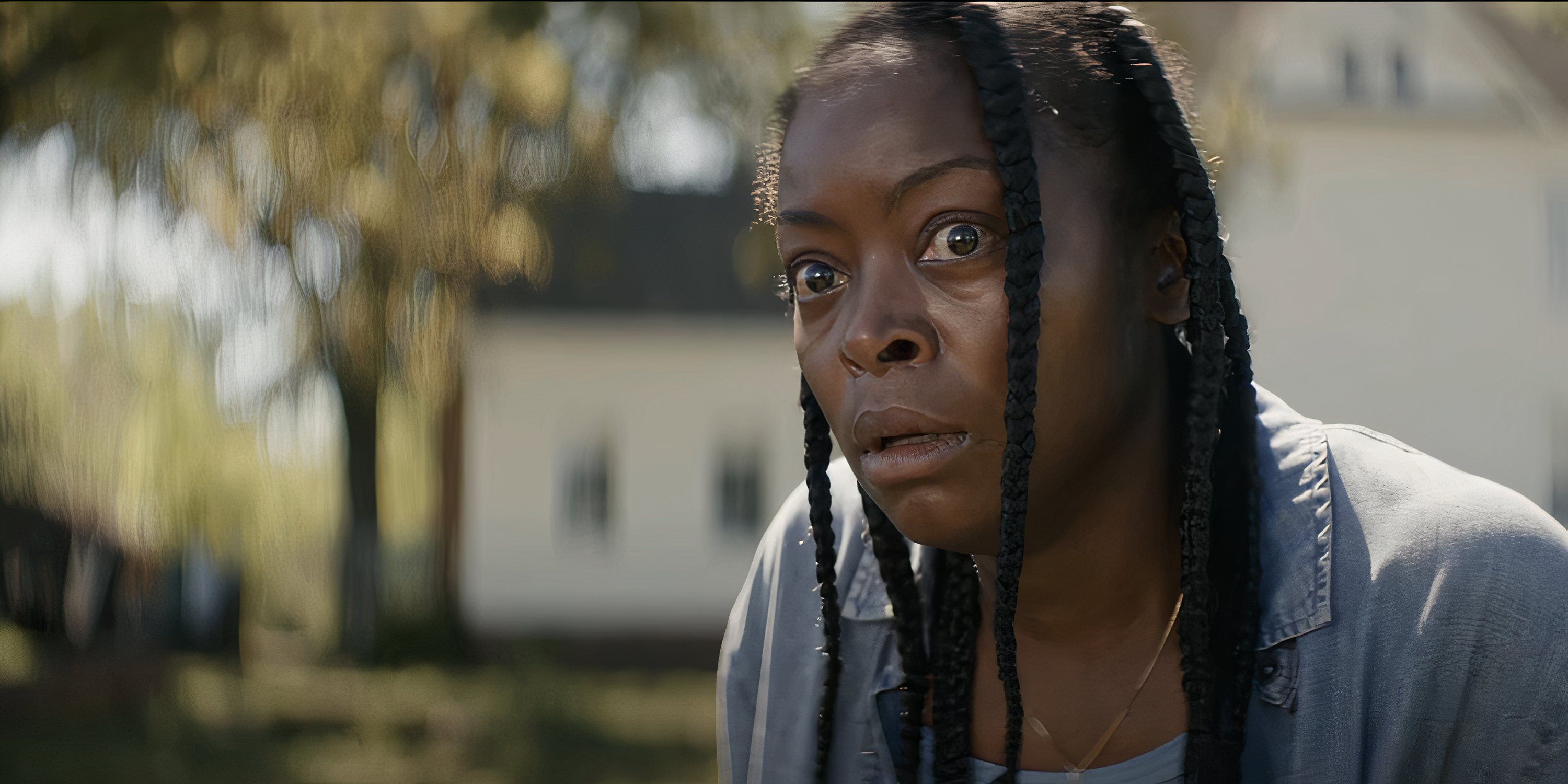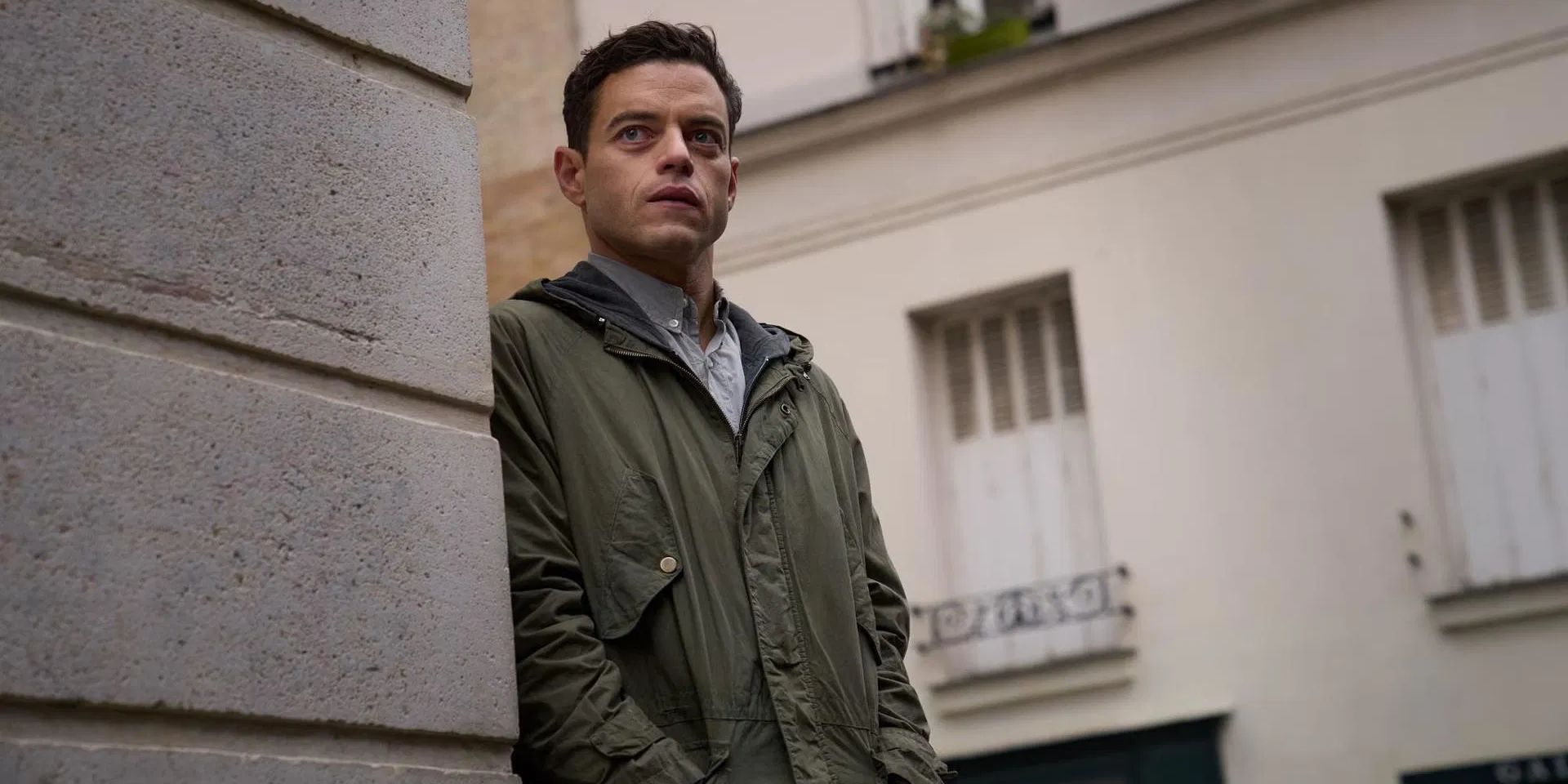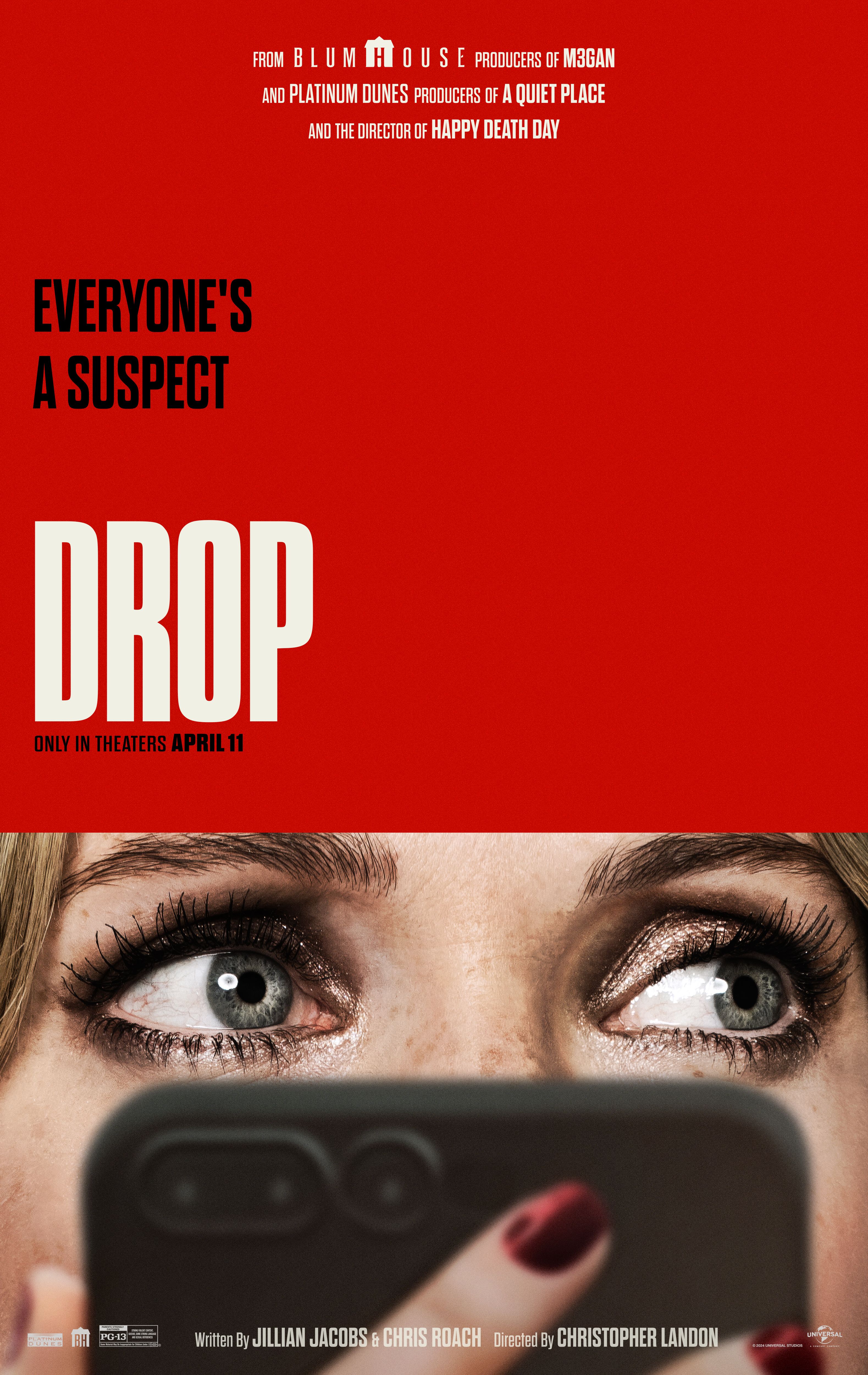Directed by horror expert Christopher Landon of Happy Death Day fame, starring Meghann Fahy of White Lotus and Brandon Sklenar of Yellowstone, and distributed by the ever-popular Blumhouse, Drop seems poised to be 2025’s most talked-about thriller so far. Given this year’s strong start with great film releases, this pulse-pounding tale of suspense, intrigue, betrayal and conspiracy has some major competition. With its lean runtime, spare cast of characters and limited setting, Drop makes the most of everything it has. Mixing abject terror and heart-stopping thrills with deadpan humor, tender human drama, budding romance and a dash of internet meme culture, Drop can be best described as a predictable but very effective Hitchcock film for the 21st century.
For the first time since her violent husband’s death, Violet (Fahy) has finally decided to start dating again. Leaving her young son Toby with her wisecracking younger sister Jen (Violett Beane), Violet goes to one of Chicago’s most upscale penthouse restaurants to meet her date, the charming and affable Henry (Sklenar). Just as sparks fly between these two would-be lovers, Violet gets a series of obnoxious messages – which soon turn threatening. An anonymous restaurant patron is sending her threats, revealing her sister and her son hostage. With nowhere to escape and no good options, Violet must comply with the messenger’s demands to save her family – including sabotaging and killing Henry. Worst date ever doesn’t even begin to cover it.

Related
Wake Up Review: This Canadian Indie Slasher Movie Wastes Its Outrageously Great Premise
Indie horror movie Wake Up tries to reinvent the slasher film, but goes overboard with frustratingly flat characters and overly serious deaths.
Drop Revisits The Classic Hitchcock Thriller But With A Sleek Modern Edge
The Use Of Modern Technology As A Plot Device Enhances Suspense Rather Than Detracts From It
Drop could be described as a spiritual successor to the Hitchcockian thriller. There are echoes of the classic genre that the “Master of Suspense” codified nearly eighty years ago – a hapless everyman or everywoman protagonist, flung unsuspectingly into a world of drama, intrigue, mayhem and murder.
Forced by figures in the shadows to commit crimes to keep loved ones safe, surrounded by spies and ticking time bombs, literal and figurative, set in a glamorous confined space, balanced by romantic tension and much-needed comic relief, with a hard-earned, explosive climax and an icy blonde in the cast. Only this time, the icy blonde is the intrepid hero.
Drop is a closed-circle mystery. Most of it takes place in a fancy restaurant in a high rise, surrounded by cameras, windows and urban darkness. It’s a gorgeous and versatile stage. It can be romantic and intimate or suffocating and oppressive, like a padded cell or a fishbowl. Marc Spicer’s cinematography, Ben Baudhuin’s editing and the entire sound department are practically their own characters.
Dutch angles, bird’s eye views, dizzying upward-angle shots and claustrophobic close-ups all help to create the world’s worst date and a pervasive atmosphere of disorientation and dread.
The scenery becomes more cramped and chaotic, and the sound design swells alongside the ragged synthesizer score when Violet’s emotions are at their peak. When she is at her most vulnerable, the world vanishes into darkness and falls silent, leaving Violet and Henry alone together with their thoughts and feelings. The film makes such good use of its confined space that it’s almost jarring when the climax moves to a different setting.
Technological horror can be hit or miss. Screenlife and digital horror can deliver some compelling and creative scares, but other times, these ultra-modern technologies can be more distracting and hindering, rather than enhancing, their respective films and stories. Most of these films cheapen horror thanks to the ubiquitousness of tech, and its negative effects on society. Drop surprisingly averts this.
The use of cell phones, security cameras and the smartphone airdrop feature are all integral to the story. But this is not a story about technology or the ubiquitousness of tech in society. This is Violet’s story, her struggle to save her son and her love interest, to upend a conspiracy and stay alive. Tech isn’t even the villain, but simply a weapon in the main villain mastermind’s wide arsenal. Smartphones and cameras and the pervasiveness of technology have not killed the closed-circle whodunit – Drop has made them murder weapons, and it’s gloriously eerie and effective.

Related
Mark Ruffalo’s 6-Year-Old Thriller (That Should’ve Won Him an Oscar) Is Streaming on Peacock
An underrated legal thriller with an Oscar-worthy performance from Mark Ruffalo is now streaming on Peacock.
Some of the memes in Drop are a little obvious. Of all the elements in this film, it is perhaps the most on the nose, and possibly already dates this film. However, the use of texting, surveillance camera footage and incoming air-dropped messages – artfully superimposed over the screen alongside Violet’s reactions – is much more natural and mindfully incorporated. These elements enhance any given scene, emotionally as well as artistically.
There is a degree of escapist glamour that hearkens back to old Hollywood. The upscale restaurant setting in a glamorous sprawl in urban Chicago, plus Violet’s spacious and beautiful home, interspersed with shots of the sparkling city skyline, are all filmed with vivid gloss and lushness that compliments and contrasts with the atmosphere of dread and obnoxious memes. Red, specifically bold maroon red, is the signature color of this film.
Violet’s striking burgundy jumpsuit, luxurious wines, and rich, velvety textiles all pop in the sleek sets of the restaurant and the soft tones of Violet’s home. Red signifies danger, but this sophisticated, darker shade also has romantic connotations. It also draws the eye immediately – and Violet, in her red clothes, stands out in every shot, like a walking bullseye for both the viewer and her tormentor.
Drop Makes The Most Of Its Spare Cast And Set
Meghann Fahy and Brandon Sklenar Excel As Tormented Thriller Leads
The White Lotus alum already proved her chops as Daphne Sullivan, but in Drop as the hero and leading lady, Meghann Fahy shines. Her range of tormented microexpressions convey just the right amount of deep angst, vulnerability and helplessness, balanced with a natural awkwardness, deadpan quips and feats of daring and drama. She is totally likable, and even as her attempts at rebellion and fighting are repeatedly and cruelly thwarted, when Violet finally gets the upper hand, the payoff is cathartic.
Brendan Sklenar continues his streak as the desirable romantic interest, portraying an approachable masculinity that pairs well with Fahy’s performance. He is just the right amount of unassuming, accommodating and competent that he both charms the viewer and arouses suspicion at different turns. The supporting cast doesn’t slouch. Considering that everyone is a suspect, these actors make the most of their roles.
Violet Beane as Violet’s snark machine sister is a great comedic presence, reminiscent of another Hitchcockian archetype, the sarcastic sister as seen in Strangers on a Train. Gabrielle Ryan, Ed Weeks and Reed Diamond all give cartoonish glee to their characters, but the standout is Jeffery Self as Matt, the peppy and overenthusiastic waiter who provides the film’s most consistent and effective comic relief and steals every scene he is in.
These supporting actors, alongside Sklenar, all get to take turns being charming or creepy. Like Violet, the audience may not know when to laugh or panic.
One of the most modern elements of Drop is the depiction of Violet and her tragic past as a survivor of marital and domestic abuse. The death of her violent and volatile husband and his effect on her young son haunts her; she’s a therapist helping patients recover from abusive relationships.
The catalyst of this evening is her decision to go on a date with a man she met on a dating app, her first date since her husband’s death and her first attempt at trying her hand at romance. It’s also her tragic past as a “killer widow” – and her choice of date – that makes her the chosen target of the vicious killer behind a major conspiracy. It also ends up being a poignant point of connection between Violet and Henry. Abuse and its psychological effects are tricky topics and can be tough to tackle, let alone portray on film.
While Drop doesn’t completely delve into the depths of Violet’s psyche or her fraught, tragic marriage, it dips in just enough to provide a rich subtext that doesn’t drag the narrative down but isn’t too glib to downplay the harsh effects it has on the characters in-universe. If anything, the abuse subtext provides the films more disturbing sequences, bordering on psychological horror.

Related
Blumhouse’s Newest Horror Movie Hits Box Office Milestone Despite Mixed Reviews
The latest horror film from Blumhouse Productions passes a major box office milestone in spite of middling reactions from critics and audiences.
Drop Is Weighed Down – But Not Sunk – By Clichés
Dazzling Sound Design And Cinematography Elevate A Thin Storyline
The digital horror in Drop works as well as it does, thanks to some truly tight editing and visual effects. Threatening text blurbs, errant memes or menacing surveillance footage are arranged, collage-like, juxtaposed with Fahy’s and other actors’ reactions on screen, integral to scenes instead of pulling away from them. Once the tech drama subsides and the curtain lifts to reveal the human mastermind, the suspense does not let up, leading to a climactic sequence that comes to a satisfying and dizzying conclusion.
Drop is a thoroughly sensory experience.
Every aspect of the design, from the camera to the sound to the costumes, tells the story so deliberately that they almost can’t be noticed. Director Landon certainly put every detail in, down to the letter – nothing is an afterthought in Drop, and this is to its benefit. With everything so tightly controlled, in both the story and seemingly in its production, it’s no wonder the audience feels so helpless and at the mercy of this world alongside its determined heroine. Landon’s previous experience with horror in Happy Death Day certainly aided him and his writers for this venture into a different genre.
Between its brief length – barely ninety minutes – the stylish opening credits sequence, the glamorous setting and the pulse-pounding, unambiguous battle of good versus evil, Drop is almost defiantly retro. It does rely on some old standbys and clichés. The story is rather contrived and too convenient in places. There are gaping plot holes; the villain’s evilness veers into cartoonish territory, and there are some cheesy bits of dialogue and embarrassing deus ex machinas. The premise, on paper, is ridiculous. But it is all executed so smoothly that some viewers might not even notice – and those that do might not even care. Besides, with such an intense story with a lot of tension, twists and turns, perhaps these clichés can be forgiven.

Related
Rami Malek’s New Spy Thriller Falls Short of Matching His James Bond Movie’s Rotten Tomatoes Score
Former Bond villain and Oscar-winning actor Rami Malek takes the lead in his own spy thriller.
Drop is not a masterpiece. It relies heavily on some of the clichés of its genre, and its premise is rather immature. However, the director, cast and crew have clearly produced and treated it as if it were a masterpiece, and thanks to its tight editing, creative direction, smart dialogue and solid performances from its actors, its flaws can be readily forgiven.
Drop makes the most out of very little – a thin story, a confined stage and a handful of important characters – and the end product is a solid, effective, likable and thoroughly satisfying thriller. Sometimes, the old and simple methods really are best.
Drop hits theaters April 11th.

- Release Date
-
April 11, 2025
- Runtime
-
85 Minutes
- Director
-
Christopher Landon
- Writers
-
Jillian Jacobs, Christopher Roach
- Stylish and dynamic cinematography and direction
- A concise and suspenseful, engaging narrative
- Cast performances balance tender emotion with humor
- Some sequences drag down the pacing
- Storytelling can be uneven



